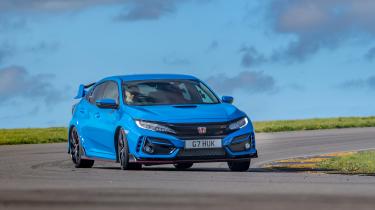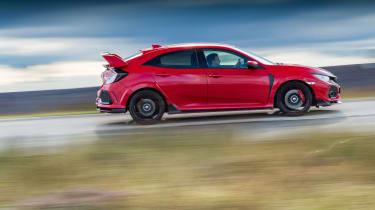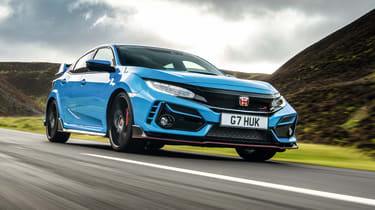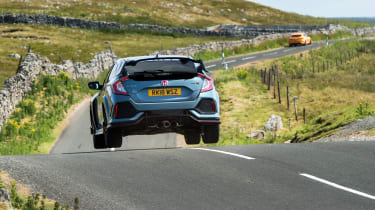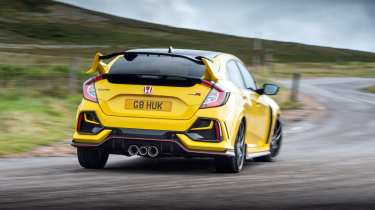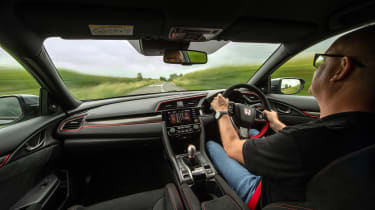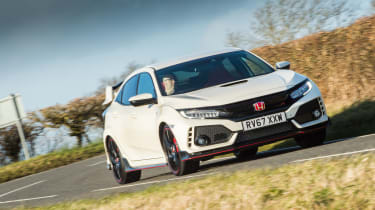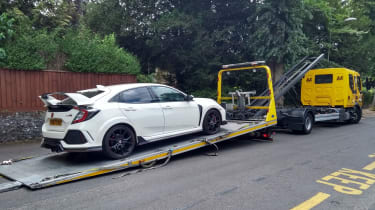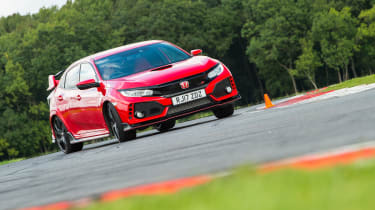Used Honda Civic Type R (FK8, 2017 - 2022) review – 169mph hot hatch bargain
Ignore the weird looks and the FK8 performs and rewards with the very best hot hatches of the last 25 years
Honda's previous hot Civics had been brilliant in parts, offering glimpses of the car it could be, and in the awesome FK8 Civic Type R, it all came together. It was surreally good: astonishingly capable, wonderfully tactile and blisteringly quick. Really, it’s one of the hot hatch greats of the last two decades – up there with the Renault Mégane R26.R and Volkswagen Golf GTI Clubsport S – and able to punch well above its weight. On eCoty 2020, it was a veritable supercar botherer, harrying the Huracán Evo, wrong-footing the Ferrari F8 Tributo and leaving the GR Yaris in its wake. Yet this is a car that can now be had from just over £20,000.
That its polarising looks were enough to blind so many to its brilliance and even put off those familiar with what it can do, is a great shame. The ugly older sibling of the FL5 Honda Civic Type R it might be, but the latest car’s driving experience owes much of its genius to its more affordable FK8 Type R predecessor.
Honda Civic Type R (FK8) review
The FK8’s 2-litre turbocharged four-cylinder engine is the same basic unit found in the previous FK2 model. A relatively conventional engine, the 1996cc DOHC four-cylinder utilises both VTEC variable valve timing and a high-capacity single-scroll turbocharger to produce its 316bhp and 295lb ft of torque.
More reviews
That torque is available on a plateau of revs between 2500 and 4500rpm, and it’s this spread throughout the rev range that provides the biggest point of contrast against Honda’s previous Type R engines. Other technical highlights include direct fuel injection, forged conrods, and what Honda refers to as a lightweight crankshaft.
Honda might not have chased the ultimate power output in the class, but let’s be fair, there’s nothing puny about 316bhp, particularly given that at 1380kg the Type R is significantly lighter, for example, than a contemporary Golf R (1553kg).
So despite the obvious disadvantage of three pedals and a gear lever versus a twin-clutch ’box when ranged against the stopwatch, and the traction limitations of front-wheel drive (although the Civic's lack of wheel scrabble and torque steer is almost otherworldly), the Civic’s 0-62 time of 5.7sec is entirely respectable today. Top speed is impressive too. That body kit looks less ridiculous when you consider the Type R can manage 169mph flat out.
The body of the Type R is very different to traditional hot hatchbacks, with a low, wide stance. Despite being larger than the FK2 that preceded it, the body in white is 16kg lighter and 38 per cent stiffer, while the centre of gravity drops 34mm lower. You sit lower by 50mm, too.
Honda also updated the FK2’s suspension, with a multi-link set-up replacing the torsion beam of the previous two generations, while the suspension itself is more rigid to ensure it only moves in the direction the engineers intended. They’re comprehensive changes, and they have comprehensive effects.
The engine itself isn’t totally free of lag – catch it off-guard and it can take some time to wake up – but once its lungs are full, the Civic fires you down the road at an almost ridiculous rate. The acceleration barely wanes at high engine speeds too, with a satisfying hard rev-cutout if you get a bit over excited.
A single-mass flywheel and precise throttle calibration means that engine response is sharp, the revs rising and falling notably swiftly, for example, when the clutch is in. It’s an honest, energetic power plant, with a breathy exhaust roar similar to that of an old Mégane RS.
You access the engine’s alacrity through a tactical, narrow-gate gearshift, that’s one of our favourite aspects of the car, the six-speed unit also featuring an integrated helical limited-slip differential to drive the front wheels.
The really important interior bits in the Type R are spot on: great bucket seats, good pedal weighting, the tactile alloy gear knob and a lovely, slim, leather steering wheel. It’s an environment that immediately sets the right tone for driving.
Where its successor, the FL5, moves things on significantly, is in fit, finish and technology – the cabin appointment is a vast improvement over this FK8. It’s worth noting too, the multi-link rear suspension means less room in the back than you might expect, too.
The first thing you notice about this Civic’s dynamics is the remarkably supple ride. There’s a mere band of low-profile rubber wrapped around each web-like 20-inch alloy, but it deals with everything a difficult road can throw at it, from low-speed lumpiness to high-speed crests and compressions. It’s a car of exceptional focus yet somehow not at the expense of everyday usability. In this regard, the FK8 Type R is no more difficult to live with than any other hot hatch.
When you really go for it, the Type R’s character crystallises into something viciously hard-edged. The steering is very precise, and the variable ratio means steering is mainly via your wrists, rather than armfuls of lock.
It’s not dripping with feel, but neither does it ever register as being a hindrance to establishing a good rapport with the car. The Type R is stable and ruthlessly fast across the ground, summoning tremendous levels of grip, turning in with real keenness and begging the driver to push harder.
It’ll oversteer on turn-in if provoked with the brakes, but its default setting is grip, grip and more grip. It’s a big car – every time you climb out to look at it, particularly in profile, it seems more like a sports saloon than a ‘hot hatch’ – and occasionally feels it, trading a smaller hatch’s hyperactive agility for a more grown-up effectiveness, but that shouldn’t be read that the experience is in any way dull. It’s a 169mph riot.
Additional variants appeared over the years to expand on the Civic’s stunning driving experience, with the Sport Line doing precisely what it says on the tin by softening off the experience ever so slightly, but never relinquishing the Type R’s underlying capability.
> Ford Focus ST Track Pack v Honda Civic Type R
Yet it’s the Limited Edition that really blew us away. Its drop in weight, both in the body and in its bespoke forged wheels, only enhance the Type R experience. It’s as focused, as sharp and as engaging as any Porsche 911 GT3, but because you can experience it at speeds lower than those necessary for bigger and more serious driver’s cars, it’s perhaps even more engaging more of the time.
Specs
| Civic Type R | Type R Sport Line | Type R Limited Edition | |
|---|---|---|---|
| Engine | In-line 4-cyl, 1998cc, turbocharged | In-line 4-cyl, 1998cc, turbocharged | In-line 4-cyl, 1998cc, turbocharged |
| Power | 316bhp @ 6500rpm | 316bhp @ 6500rpm | 316bhp @ 6500rpm |
| Torque | 295lb ft @ 2500-4500rpm | 295lb ft @ 2500-4500rpm | 295lb ft @ 2500-4500rpm |
| Weight | 1380kg (233bhp/ton) | 1395kg (230bhp/ton) | 1333kg (241bhp/ton) |
| 0-62mph | 5.8sec | 5.8sec | 5.7sec |
| Top speed | 169mph | 169mph | 168mph |
| Price new | £30,995 (2017) | £35,400 (2021) | £39,995 (2020) |
| Price now | From £20,000 | From £30,000 | From £45,000 |
What we said
‘My most vivid memory of the FK8 Type R is from a hot hatch group test (evo 288) on the B6277, heading to Alston. It’s not a road I know well, full of deceptive corners and tricky surfaces, but the Civic nailed every apex and made me feel like a local road rally expert. I was staggered at how tirelessly the front end found apex after apex with absolute precision and no corruption from torque or the limited-slip diff, the suspension shrugging off a surface that bamboozled lesser cars
‘And all the while I was locked into place by a superb seat, calmly conducting progress, enjoying the flow of feedback from the steering, the snappy, engineered feel of the gearshift and the outstanding brake feel. Especially the brake feel, actually. The performance of the brakes was fabulous but it was the brilliance of the pedal feel – the lack of dead travel, the perfect weighting, the precision with which you could lean into it – that made me realise how skilled the FK8 development team was.
‘I don’t think it’s a stretch to call the FK8 Civic Type R the 911 GT3 of hatchbacks, and at an astonishingly good price. A steal, in fact. For me, there’s no catch, but others just can’t get past the overblown styling. It’s not to my taste either, but when everything else the car does is so special, so satisfying, I’m more than prepared to look beyond it.’ – John Barker
'The weight loss may look relatively minimal on paper, but as a percentage of the total it’s well worth having, and sure enough, the additional keenness of the Limited over the regular Type R is immediately obvious. There’s more positive weight to the steering, with a beautifully natural feel to it and unerring precision, and in mild ambient temperatures outright grip of the car is sensational, yet not at the expense of possessing adjustability with the throttle. Add to that a brake pedal with a sturdy and beautifully resolved feel and you have a real driver’s car that flatters you every input.
‘Taken to a circuit, the Limited Edition reveals another layer of performance and ability. With the security to push that much harder, the car’s mobile tail is much more obvious: it’ll oversteer on demand, but it’s a more controlled characteristic than in the wild Trophy-R. The engine has it all – power, torque and response – and the braking power and stopping stability are particularly noteworthy.
‘So much grip is generated through the front axle on a corner’s exit that the Limited almost hops out of the corner with the conflicting longitudinal and lateral forces at play.’ – Adam Towler
Living with it and running costs
‘Believe every positive word you’ve read about it: every group test win, every track battle victory. It really is that special. For me, it’s on a par with my all-time favourite hot hatches, namely the very best ones from Renault Sport.
‘There’s the confidence-inspiring composure, a remarkable sense of control, the lashings of feedback from every point where your body is in contact with the car. Never did I tire of the way you could snap the deliciously mechanical gearshift from third to fourth with just a flick of the fingertips, or the way the FK8 could rip into a corner then slingshot itself out the other side. Heck, from the driver’s seat even all that overwrought exterior styling seemed appropriate – the Honda has the moves to justify the ostentation. Put simply, I adore the way the Civic Type R drives.
‘But now the reality check. It isn’t a perfect car to live with. Its low-speed ride could be considered firm by non-petrolhead passengers, the infotainment system is laggy and unintuitive, and the satnav seems largely oblivious to traffic problems that it is supposed to display. Also, as I found with the previous-generation CTR, the heat/dust shields behind the front brake discs have an irritating habit of catching loose stones, which then rattle around like a boiled sweet in a metal tin, or cause embarrassing screeching noises during parking manoeuvres. But these were all niggles I could easily overlook in exchange for that sublime hot hatch driving experience.
'Our long-termer also had a couple of bugs of its own. The front parking sensors would chime false warnings during and after rain, and the tyre pressure monitor needed to be reset two or three times after any tyre or tyre pressure change before it would stop reporting phantom punctures. But these were minor things, offset by a rock-solid build quality inside, with a total absence of rattles and creaks that would shame many a car costing several times the FK8 Type R’s £30,995 asking price when new (or £32,995 with our car’s GT trim, which adds goodies such as parking sensors, dual-zone climate control and an upgraded stereo).
‘In terms of running costs, an overall average of 29.9mpg seemed quite reasonable given the pace the Civic could offer and how frequently I enjoyed it. Our car was due its first service at around 10,100 miles – about 500 miles after it went back – and this would have cost £230 at my nearest dealer. However, the brake pads were close to needing replacement too, so that figure would have soon ramped up. The original front Continental Sport Contact 6s were done long before that, at 6500 miles, which included a couple of track outings.
‘We replaced the Contis with four Michelin Pilot Sport 4 Ss (£917.28), as we were intrigued by Michelin’s claim that the 4 S has a significantly slower wear rate than the Sport Contact 6. Sure enough, if the front pair continued to wear at the rate we saw over the first 3000 miles, we could have got over 11,000 road miles from them, which seems far more palatable. Their performance was impressive too, with at least equal levels of outright grip and traction as the Contis, but with the limits more clearly signalled by a much larger breakaway window. They seemed like a good match for the Type R.
‘Shame, then, that two of them were destroyed after just 250 miles when a nasty ridge in the road caused the inner rims of both left-hand-side 20-inch wheels to pierce the tyres’ sidewalls. Not the Michelins’ fault, I’m sure, rather a sign that such large wheels with super-low-profile tyres (245/30s) don’t mix with British roads.
‘Further evidence of this had come months earlier, when a pothole bent the outer edge of one of the rims. This cost £174 to have straightened and refurbished by a specialist, but at least this was cheaper than the £541 Honda asks for a new wheel.
‘And it was these two events that caused my relationship with the Type R to turn sour. From then on, every journey was tainted. I found myself scanning the road for the smallest imperfection, to the point of distraction, and rarely daring to properly commit to a good road for fear of another bent rim or four-hour wait for a recovery truck. The car simply felt too fragile to be used as I wanted to use it. Ultimately, this knocked the FK8, as it is, off my shortlist of cars to buy used one day. An FK8 on some tasteful aftermarket 18-inch wheels, however. Now that I might consider…’ – Ian Eveleigh
What to pay and buying guide
The enormous price gulf between the FL5 Civic Type R and the FK8 means that used values have held strongly for the latter, and while post-2020 models are sweetest of the lot (particularly in lightweight Limited Edition guise), the fundamental strengths of the car span across all versions.
The cheapest FK8’s start from just over £20,000, rising to over £30,000 for a tidy Boost Blue facelift with low mileage. Limited Editions, being limited, are rare and expensive, with the only example we could find at the time of writing being listed for just under £50,000.
Being built to withstand repeated track use, a well maintained Type R is unlikely to suffer from any major mechanical issues, although some owners have reported graunching gearshifts when rushing through the six-speed ‘box.
Needless to say, these cars are likely to have been driven ‘properly’, so look for good maintenance history and the condition of the tyres, wheels (important, read above) and brakes, for evidence that an example has been well looked after.
